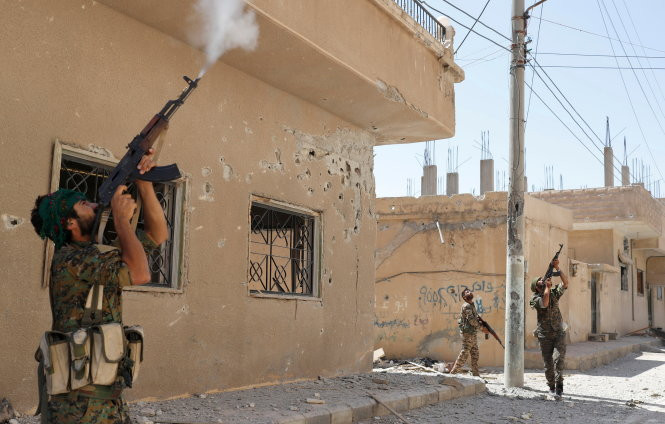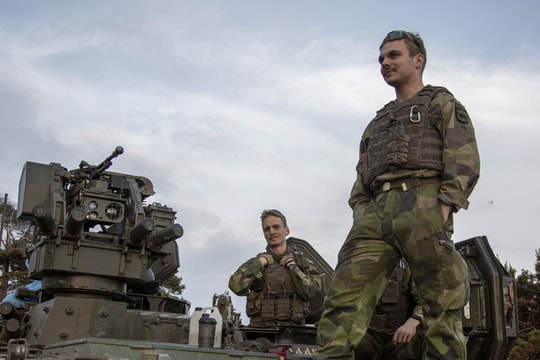US-Russia fighter diplomacy: Too fast, too dangerous
A Russian SU-27 fighter jet equipped with air-to-air missiles recently approached a US RC-135 reconnaissance aircraft, showing that Russia-US relations are "heating up" too quickly and dangerously.
 |
| The Syrian battlefield is testing Russia-US relations. In the photo: US-backed Kurdish fighters fighting in Raqqa city. Photo: Reuters |
Warming Russia-US relations was one of US President Donald Trump's campaign promises.
Entering the White House, Mr. Trump seemed to make an effort to fulfill this promise, but the warmth between these two largest nuclear powers, if anything, was only hot encounters between fighter planes. Why?
Too fast, too dangerous
Back 3 days ago in the sky over the Baltic Sea, a Russian SU-27 fighter equipped with air-to-air missiles approached a US Air Force RC-135 reconnaissance aircraft at very high speed.
Since the beginning of June, there have been more than 35 times that Russian and American aircraft and warships have "interacted" in this way in the Baltic Sea area, however the incident on June 19 marked an unprecedented "intimate" distance between the two aircraft: only about 1.5 meters, according to information from the US side.
The aerial approach took place at the same time that the North Atlantic Treaty Organization (NATO) announced the completion of the deployment of troops to the Baltic region. In total, NATO has about 4,500 troops stationed in Latvia, Lithuania, Estonia and Poland. Russia's ambassador to NATO, Aleksandr Grushko, called this an arms race that contributes to "undermining security instead of strengthening it."
Moving to the Syrian battlefield. On June 18, for the first time since the war broke out, a missile from a US aircraft shot down a SU-22 attack aircraft of the Russian-backed Syrian army.
That action angered Moscow so much that the country's Defense Ministry threatened to shoot down any flying object that appeared on the western bank of the Euphrates River in Syria. Thinking that Washington would be wary, a day later the US continued to shoot down an armed drone belonging to the Syrian Government.
It should also be recalled that the shooting down of the SU-22 was the fourth time in a month that the US has attacked pro-Syrian government forces to protect “moderate” rebel groups.
Commenting on the clashes, UN Secretary-General Antonio Guterres warned that the situation was “very dangerous” and could lead to an escalation of the war in Syria.
Sharing this view, Mr. Patrick J. Buchanan, who has advised three US presidents, said that Washington is at risk of direct conflict with Syria, Russia, Hezbollah, Iran and even Türkiye once the terrorist group Islamic State (IS) officially disintegrates.
Whose hands are the Russia-US relations in?
Taken together, the above events illustrate the rapid erosion of Russia-US relations. Mikhail Rostovskiy, a veteran writer for the Moskovski Komsomolets newspaper, commented that from now until the US midterm elections (November 2018), the best-case scenario that can be expected is that Russia-US relations will remain in the current cold state, instead of continuing to fall to the level of "disaster".
Recently, in a hearing before the US Senate Foreign Relations Committee, Secretary of State Rex Tillerson had to admit: “US-Russia relations are at an all-time low and continue to erode. Our goal is to stabilize this relationship.”
If the US Secretary of State said so, a question arises: Why are Russia-US relations under President Trump, who is considered to have a lot of sympathy for Russia, worse than under Barack Obama?
Expert Rostovskiy believes that the reason stems from Mr. Trump's lack of political experience, that he has broken one of the unwritten rules of American politics.
It can be summarized as follows: If the president wants to radically change an important US policy axis, in the early stages, he must not reveal this intention!
Commenting on the US House of Representatives delaying voting on a new sanctions package against Russia, which was passed by the Senate with an almost absolute majority (98-2), Mr. Rostovskiy said that Republican senators wanted to "toughen up" Mr. Trump to show "who has control", but actually passing the sanctions package - indirectly discrediting the Republican president - does not benefit them.
“The problem is not Russia but the struggle in American politics. The fate of Russia-US relations is in the hands of politicians in Washington… Neither Mr. Trump nor even Russia can change anything. Mikhail Rostovskiy(Russian political analyst) |
According to TTO
| RELATED NEWS |
|---|



